Not a lot of bands have ever done like Led Zeppelin, which is a thing people still talk about today. They came out of Britain's soul and changed, and they didn't just cause a stir, but the whole idea of rock and roll was spelled out to people as we know it. Jimmy Page, who played guitar, got the group together in 1968, and it was with Plant, Jones, and Bonham that's when something very special started happening fast.
The lineup was joined by John Paul Jones on bass and keyboards, Robert Plant singing, and Bonham taking the drums; it was mixed up just right. When their first record got launched, they came in loud and mixed blues, some folk, and hard rock into a sound that felt like it was from long ago, plus electrified.
Time could just stand still, and mysticism was created from their songs and their power, which was not held back even a little bit. They became something more than just some band; Led Zeppelin was spoken about as a force.
Their effect isn't just back in the old days. It's shaping the style of a lot of musicians, and it still works in some places it is meant to be. The feeling their music gives is still kept by people who love rock; it has been kept alive.
The members of Led Zeppelin
Led Zeppelin's strong sound, which had very different players, and each one gave something that nobody else could give, combined with a unique sound. Jimmy Page was on board and, even before the group started, you could tell that his knowledge of how to put music together with different musical styles.
The way he would boldly play guitar gave the band something special that other bands didn't have, and he put blues, rock, and folk together like it was always meant to be that way. Robert Plant's voice worked alongside Page's style very well. Each show became a real treat, not only because of what he played but because his energy on stage made everyone pay attention, even if they didn't like rock that much.
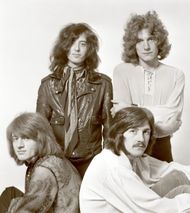
John Paul Jones was behind the others, but what he did was important, too. On his bass and his keyboards, Jones didn't only play notes, he played the notes really well and arranged songs in ways that made people listen closer.
At the heart of things was John Bonham because he didn't just play well, he gave everything a kind of force that can't be faked, and each beat was felt by everyone. The four weren't just members in a band, no, because together, a new name for rock was made by them, and their mark is still felt to this day.
Read More: 8 iconic Chester Bennington songs that define his legacy
The birth of Led Zeppelin and a rock revolution
Before they made their mark in rock history, the band started as an idea in Jimmy Page's mind. Page, a seasoned player in British music and one of the most in-demand session guitarists of the 1960s, wasn't ready to give up when The Yardbirds' final lineup fell apart.

He saw this breakup as a clean slate, a chance to create a group that could stretch musical limits and capture the raw energy he had in mind. This wasn't just about picking up where The Yardbirds stopped; Jimmy Page aimed to form a band that would change people's idea of what rock music could be.
He put together a lineup, and John Paul Jones, another studio musician who was good at arranging and could play many instruments well, was the first to join. Through a suggestion, Jimmy Page found Robert Plant, a young singer with a voice that could cry, whisper, and roar all at once. Plant then recommended his friend John Bonham, who drummed with both power and accuracy.
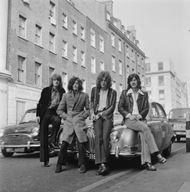
From the start, they worked well together. To finish up some leftover duties under The Yardbirds' name, they played for a short time as The New Yardbirds, but it soon became clear that this wasn't just a continuation, it was something new. The band name Led Zeppelin started as a joke. Someone joked that their project would fail, like a "lead balloon."
The group, with a knack for irony, took this image and ran with it. They changed "lead" to "led" to make sure people got it right. This turned a simple punchline into a lasting legacy. Led Zeppelin didn't just come into being; they burst onto the scene set to change rock music for years to come.
Read More: 8 iconic Led Zeppelin songs every rock fan should know
How Led Zeppelin redefined rock in just nine days
When Led Zeppelin dropped their first album, named Led Zeppelin, in January 1969, they didn't just put out another rock record, they blew the doors wide open to a new sound era. Instead of easing folks in, the band hit hard with a mix of heavy blues, mind-bending distortion, and non-stop energy that felt new and different.

Back then, popular rock still stuck to cleaner, more traditional setups, but Led Zeppelin brought in a rough electric edge that most people hadn't heard before. Songs like Good Times Bad Times came at you with booming drums and fierce guitar riffs, while Dazed and Confused took you on a darker, more mesmerizing ride, showing how the band could push the limits of song structure and feel.
What's even more mind-blowing is that they recorded the whole album in just nine days, which is hard to believe given how groundbreaking and rich it sounds. This quick work didn't hurt the quality; if anything, it caught a once-in-a-lifetime spark that became part of the album's charm.

From Robert Plant's screaming vocals to Jimmy Page's aggressive yet complex guitar playing, their first album wasn't just a bold hello, it was the sound of a band already changing rock music's future.
Read More: Top 6 J. Cole songs you can't miss
The Rise of Led Zeppelin
Led Zeppelin showed up in January 1969 with their self-titled album, and it wasn't just the start of another group; it meant rock music was about to change in ways people didn't expect. Because this thing they showed up with was thunder mixed with blues, folk, and hard rock that seemed wild and also looked ahead; almost nobody played like that before, till this day.
They couldn't have gone any further, and this sound they kept building was always changing. With Led Zeppelin I and II, the blues feeling and those sharp guitar riffs were already in the noise; few had heard such before. By 1970, things were moving into something new. The band decided that in Led Zeppelin III, they would make the sound more mellow in their songs, this way, like it was hinting at bigger dreams.

Gallows Pole and That's the Way got played by them, and it was clear the band didn't mind making the sound softer sometimes; the real force didn't disappear, though. Not many bands had done such switching around before them. It was Led Zeppelin who changed what rock could sound like.
Then came 1971's Led Zeppelin IV. It really was an example of how music could show different sides, with the mystical feel that Stairway to Heaven brought as it rose. Partly it was recorded at this far-away place called Headley Grange, where stuff was done kind of weird compared to regular studios, and because of that, you would hear things you could never hear before. And Jimmy Page did not sing it all at once, which gave it an almost magical feel.
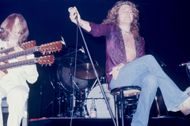
Some people noticed it sounded like Taurus by the band Spirit, and then there was a court case about this. The lawsuit was filed, and different sides argued about if that was fair or not, and this makes the story go on.
By the middle part of the 1970s, the band had moved into a time when their music started getting wild and going directions folks didn't really expect, so their albums Houses of the Holy (1973) and Physical Graffiti (1975) mixed styles in ways no one else dared, doing things like trying funk on Trampled by a Maker.
Kashmir, on the other hand, was orchestral and show-offy, with a sound that just keeps rolling. Synthesizers were brought more and more into their songs by John Paul Jones, and it seems the group was living forever. The new version of the band came out in 1980 and everything stopped.

His wild drumming really stuck, though, especially on When the Levee Breaks. That song's big echoing beat, done in the stairwell, ended up being used extensively in their early sets. Their sound was never quite the same, and fans missed that.
Most of Zeppelin's legendary moments weren't really planned out with a bunch of details, and usually, there are times when they made mistakes on the road. Like for Led Zeppelin IV, it was Bonham who was casually banging out this beat from an earlier era and out of nowhere, the rest of the band got right into it and, super quick, Rock and Roll was made, a song that is remembered as one of their loudest, wild tracks.

They didn’t expect it to become that big. What makes the legacy of Led Zeppelin so full is these spur-of-the-moment pieces, the wild new ideas, and even some trouble with the law that showed up sometimes.
The music is always played loud, and then Physical Graffiti comes in with that mix of different sounds so well blended. They have been called a band that won't be still for long, so every album kind of became its own part in their story, and this record is no exception to all of it.
Read More: 8 Blackpink tracks that slay every time
Awards and recognition
Led Zeppelin has had a huge influence on rock music. You can see this in their lasting sound and the many big awards they've won over the years. They've picked up several Grammy Awards, including one for the Lifetime Achievement Award in 2005 and another for Best Rock Album for Celebration Day in 2014.

They're also in both the Rock and Roll Hall of Fame in 1995 and the UK Music Hall of Fame in 2006, which shows they're among the best of the best in music. Their impact goes beyond just rock, earning them prizes like the Polar Music Prize in 2006 and the Kennedy Center Honors in 2012, which celebrate how important they are to culture.
They've also won the International Artist Award from the American Music Awards and a Lifetime Achievement award from the Ivor Novello Awards, proving their lasting mark on music. Even when they got back together to perform or release films, people loved it.
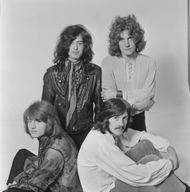
MOJO said they were the Best Live Act in 2008, and Classic Rock Roll of Honour praised their 2007 reunion show, their Celebration Day film, and their work to re-release old music. All these awards and honors show just how much Led Zeppelin has shaped rock music and left a mark that won't be forgotten.
Read More: 8 greatest Aerosmith songs of all time
The legacy of Led Zeppelin
Led Zeppelin's legacy stands as one of the strongest and longest-lasting in rock music history. Their groundbreaking mix of blues, folk, and hard rock didn't just reshape the genre; it sparked creativity in countless artists across generations. Beyond their sound, Led Zeppelin's take on album-oriented rock complex songwriting and thrilling live shows raised the bar for musical skill and imagination.
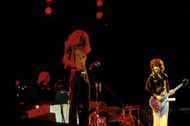
Their cultural sway goes past music, shaping fashion, attitudes, and the very spirit of rock stardom. Even years after their heyday, their songs still strike a chord with new listeners, and their mark shows up in the work of artists across various styles. This enduring impact proves their unique gift to capture raw feeling and timeless energy, cementing their spot not just in music history but in the wider cultural mind.
Read More: 10 greatest Bob Dylan songs that stand the test of time
Looking at Led Zeppelin's story, you can see their journey changed rock music and left a huge mark on culture. They started in the late 1960s and became leaders in hard rock and heavy metal, reshaping how music sounded with their strong style and creative ideas.
Their tale isn't just about famous albums and amazing shows, but also about how they keep inspiring musicians and fans all over the world. Even though their main run was short, Led Zeppelin's big impact means they're still a giant in rock history, a lasting symbol of creativity, passion, and musical skill.
Keep reading SoapCentral for more informative content!
Also Read: 6 Guns N' Roses songs that defined rock history
